News
Allow Each State To Negotiate Minimum Wage — Southern Govs
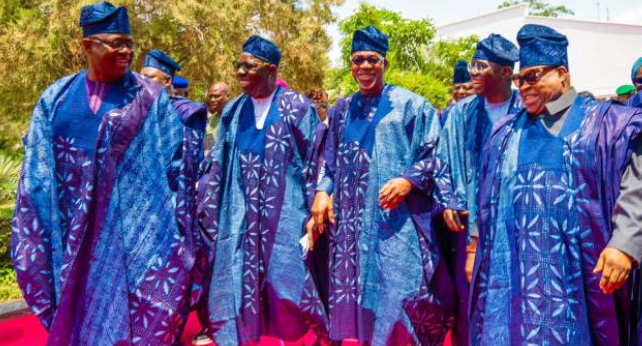
By Kayode Sanni-Arewa
The 17 Governors from the Southern part of Nigeria under the aegis of the Southern Governors’ Forum have advocated that each state be allowed to negotiate a new minimum wage they can pay with the labour unions.
This was contained in a communique issued at the end of their meeting held in Abeokuta, the Ogun State capital.
“The Forum discussed the minimum wage issues demanded by labour and unanimously agreed that the minimum wage should be reflective of the cost of living and ability to pay, and each State be allowed to negotiate their minimum wage,” the communique partly read.
In the 16 points communique, the Forum called for strengthening of fiscal federalism and devolution of powers and expressed concern over current practices where mineral licenses are issued and explorations undertaken without recourse to state governments
It noted that issuing mineral licenses without carrying the states along have resulted in criminal activities, attendant negative environmental impact, ecological degradation, and with no remediation commitment or revenue accruing to the States or the Federal Government.
The governors maintained that being the economic and industrial region of the country, there was need to address the inadequate power supply in the region by taking advantage of the recent constitutional amendment that now allows States to regulate, generate, transmit and distribute electricity whilst also considering optional sources like renewables.
The southern governors said they have resolved to aggressively embark on energy transition plan from fossil fuels (petrol and diesel) to cleaner energy and specifically CNG (Compressed Natural Gas) and ultimately EV’s (Electric Vehicles) to help reduce the cost of transportation, which would lower the cost of food, goods and services of the citizens and residents.
The meeting also called on the Federal Government to rehabilitate, repair and reconstruct Trunk A roads and transfer some roads to States that have expressed interest in taking them over, applauding President Tinubu for conceptualizing and commencing the construction of the Lagos-Calabar Coastal Road, which cuts across eight states of the region.
The Communique hinted that the governors have resolved to commission a regional multimodal transport master plan that would prioritise connectivity of rail, road, air and water transportation, to facilitate interstate, intra-regional movement of persons, goods and services and thereby enhancing the ease of doing business.
It further stated that Southern States Development Agenda (SSDA) would comprise of a team whose primary responsibility is to outline a holistic plan to foster trade and investment, sustainable growth and development, economic prosperity, social harmony and food security for the region would be set up.
The Development Agenda, the governors added would work hand in glove with individual State Investment Promotion and Facilitation Agencies, the Nigeria Investment Promotion Commission (NIPC) and other relevant MDA’s and multilateral agencies as necessary.
On issue of state police, the Governors resolved to continue to advocate for the creation of State police against the backdrop of the success of the regional community based security outfits, which have been effective in intelligence gathering.
The governors, the communique further stated, resolved to remain united and committed to oneness of purpose, noting that the physical boundaries that divide the people of the south could not be compare to the strong bonds of enterprise, resilience and culture that they share just as they have resolved to be deliberate and intentional about intra region trade, partnerships and investment facilitation and promotion which was agreed would require a structured and coordinated collaborative approach.
The members of the Forum commended Mr President Tinubu for the food palliative support to States and the laudable economic recovery reforms and policies through the implementation of the Renewed Hope Agenda pledging to support him in his unwavering resolve to reposition the country and build a greater future for all.
It would be recalled that at the end of the meeting, Prince Dapo Abiodun was chosen to provide the needed leadership as Chairman of the Forum, while Professor Charles Chukwuma Soludo, the governor of Anambra State waa appointed as the Vice Chairman.
The communique concluded that quarterly meetings of the Forum would be held and rotated among member states.
News
Finally , Lagos Court frees Quadri, young Nigerian who stood before Obi’s convoy in viral photo

The Apapa Magistrate Court, Court 9 sitting at Orege, Ajegunle – Sikiru Adagun Courthouse, has discharged and acquitted Alabi Quadri, the young Nigerian who became a national symbol of courage during the 2023 general elections, for standing boldly in front of the convoy of then-Labour Party presidential candidate Peter Obi.
He was discharged and acquitted of conspiracy to commit felony and armed robbery.
The court held that he has no case to answer.
Quadri was brought to court on Thursday, April 17, 2025, after spending months in Kirikiri Prison, Lagos.
The Nigerian Correctional Service produced Quadri at the Apapa Magistrate Court, located at Orege, Ajegunle—Sikiru Adagun Courthouse (Court No. 9).
Quadri’s case was initially slated for a hearing on April 28, 2025.
However, human rights lawyer and activist Inibehe Effiong had revealed that both he and the Director of Public Prosecutions (DPP) requested that the date be moved forward, and the court granted the application.
Quadri gained widespread attention after a viral video showed him, a teenage boy at the time, fearlessly standing before Peter Obi’s campaign convoy—a moment many Nigerians interpreted as a symbol of youthful defiance and hope during a tense election period.
The media reported that Effiong revealed that Alabi’s recent painful descent into the Nigerian prison system was not due to any major crime but rather a result of prolonged malice and resentment harboured by some self-acclaimed ‘area boys’ (thugs) in his neighbourhood.
According to the lawyer, these individuals felt entitled to a portion of the unexpected attention and goodwill, including financial support, that Alabi received following his moment in the spotlight during the 2023 presidential campaign.
Effiong, who recently visited the Apapa Magisterial Court in Lagos alongside Alabi’s mother and legal colleagues, stated that Alabi’s journey to Kirikiri prison was not only heartbreaking but appeared to be the outcome of a vendetta fuelled by local ‘area boys’ who felt entitled to the financial support Alabi received after his viral moment.
Effiong revealed that Alabi was abducted in January near his home while returning from work by the ‘area boys’ who had been threatening him.
They allegedly took him to Amukoko Police Station (popularly known as Pako Police Station) and accused him of being involved in street fights.
However, Alabi was then arraigned before a Magistrate Court along with four other individuals, said to be complete strangers to him, on allegations of conspiracy to commit armed robbery with cutlasses.
According to the charge sheet, the alleged victims were robbed of N579,000, comprising cash and four mobile phones.
Effiong also emphasised that despite being a minor, Alabi had been detained with adults at Kirikiri since January, pending legal advice from the Lagos State Directorate of Public Prosecutions (DPP).
News
Lawmaker Slams NBA Over Rivers Crisis, Demands Return of N300m

News
BREAKING: Unknown gunmen reportedly storm Senator Natasha’s family residence
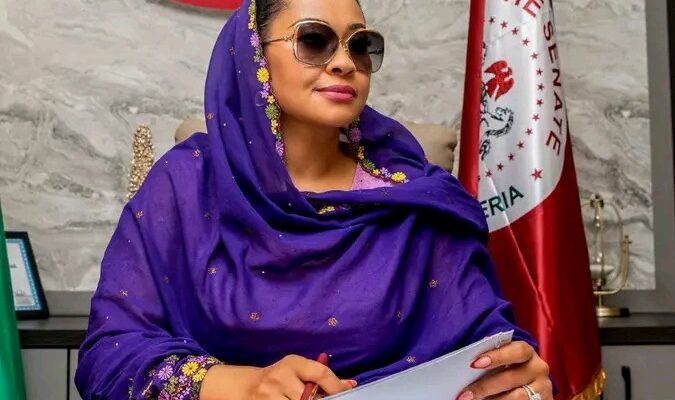
Senator Natasha Akpoti-Uduaghan’s family residence in Kogi was reportedy invaded by gunmen around 1 a.m. on Tuesday, April 16, leaving damaged windows but no injuries.
The incident happened at her hometown residence in Obeiba-Ihima, located in Okehi Local Government Area of Kogi State.
Sources familiar with the event said the attackers arrived around 1:00 a.m. Armed with cutlasses and guns, they damaged parts of the building, smashing windows and causing panic in the area. At least three men were involved in the attack.
Senator Natasha’s Chief Security Officer, Yakubu Ovanja, quickly informed the appropriate security agencies.
In response, officers from the Okehi Police Division rushed to the scene.
Although nobody was hurt and no suspects have been arrested yet, security officials recorded the extent of the damage and launched a preliminary investigation.
The reason behind the attack is still unknown, and as of now, Senator Akpoti-Uduaghan has not released any official statement. She represents Kogi Central in the Senate and is known as a vocal figure in Nigerian politics.
According to Zagazola Makama, police are still trying to figure out what motivated the attackers and are working to find those responsible.
-

 News3 hours ago
News3 hours agoBREAKING: Unknown gunmen reportedly storm Senator Natasha’s family residence
-

 News6 hours ago
News6 hours agoSnub story on removal of Rivers Sole Administrator, it’s FAKE-Chief Registrar
-
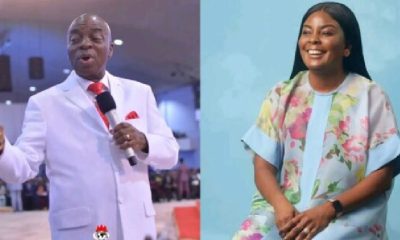
 News12 hours ago
News12 hours ago“How my father escaped assassination” – Bishop Oyedepo’s daughter
-

 News12 hours ago
News12 hours agoFG expresses sympathy for CBEX victims, urges a united effort to combat Ponzi schemes
-

 News5 hours ago
News5 hours agoSAD! Again, Alleged Herdsmen Attack Three Benue Communities
-
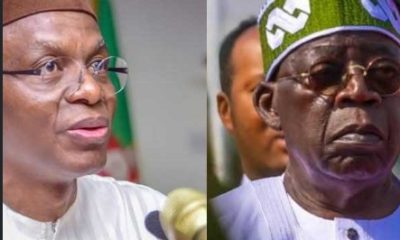
 News18 hours ago
News18 hours agoEl-Rufai labels Tinubu’s government ‘worst in Nigeria’s history’
-

 News12 hours ago
News12 hours agoWoman tragically lost her life after attempting to flee through glass door during alleged incident of domestic violence
-
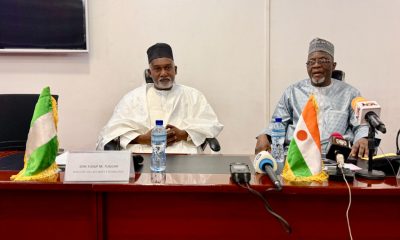
 News18 hours ago
News18 hours agoNigeria-Niger Vow to Strengthen Ties, Tackle Border Security





